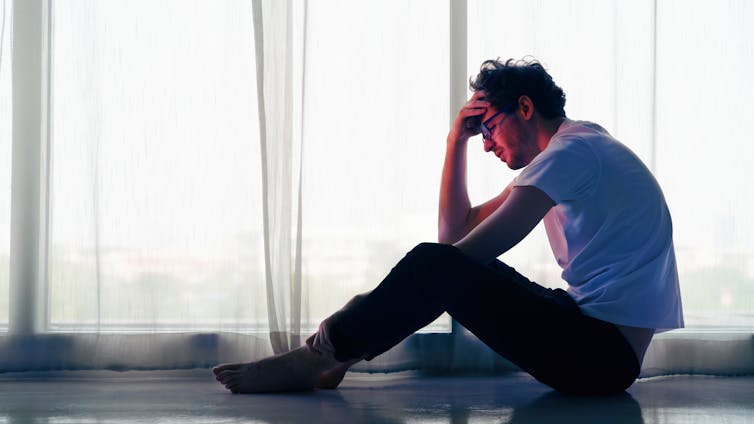Lockdowns don't get easier the more we have them. Melbourne, here are 6 tips to help you cope
- Written by Jill Newby, Associate Professor and MRFF Career Development Fellow, UNSW
As Melbourne prepares to begin a second week of lockdown, it’s important to recognise the serious toll this is likely to take on many people’s mental health.
Research during earlier COVID lockdowns in Australia found lockdowns were associated with poorer mental health, such as symptoms of depression and anxiety, among young people and adults.
A variety of factors play into this — from financial stress, to concerns about contracting COVID-19, to disruptions to work or study, to separation from friends and family.
For Melburnians, this latest lockdown will come as an especially upsetting setback. Victoria faced the longest lockdown in the country last year, and in recent months there’s been largely no COVID in the community.
If you’re a Melburnian and you’re feeling more stressed, uncertain, anxious, lonely or burnt out, or are worrying more about COVID-19, these reactions are completely normal.
But there are a variety of ways you can look after your mental health during this time, which will hopefully make it a little easier.
1. Stay connected with others
Lockdown can be extremely lonely, especially for people who are separated from loved ones, or living alone. Fortunately, the “single social bubble” is again in place, where people who live alone or single parents can nominate one person who is able to visit their home.
Keeping in touch with others — via phone, text, social media, or in other ways — can help avoid isolation and depression. Plan these catch ups so they are in your diary.
2. Think about what’s in your control, and what’s not
When facing the prospect of more uncertainty, disruption, and plans turned upside down, it can seem futile to have any expectations at all. You may be left feeling helpless.
Take the time to acknowledge this, but focus on things you can still do, and that you enjoy, or the small things you can do each day to make the day better. For example, doing a hobby you enjoy, exercising, relaxing, listening to music, or watching TV.
Focusing on the smallest of positives, the silver linings, or the things you are grateful for, can help improve mood.
It also helps to recalibrate your expectations so you’re not holding yourself or other people to unrealistic standards (which can cause more distress). Try asking yourself what you’re expecting of yourself or someone else and whether that’s realistic right now. Maybe good enough is good enough, just for one more week.
3. Look after your body
Getting a good night’s sleep, doing some physical activity, and eating healthily can help give you more energy, motivation, and help manage the emotional fallout of the extended lockdown. Limiting alcohol and drugs is also key.
 Looking after your physical health can be helpful for your mental health.
Jonathan Borba/Unsplash
Looking after your physical health can be helpful for your mental health.
Jonathan Borba/Unsplash
4. Manage anger and frustration
Repeated lockdowns are likely to evoke feelings of frustration and resentment. We might vent our anger in ways we wouldn’t normally, that make us feel ashamed or hurt our relationships.
If you feel an outburst bubbling up, step out of the room or away from your phone. Spend ten minutes writing down what you’re feeling and who is to blame. This is just for you, so don’t censor yourself. Once you have your thoughts down on paper, you’ll likely be calmer and clearer.
Then, ask yourself what more you need to know about the situation and the people in it before yelling or pointing fingers. Try asking questions rather than hurling accusations. A bit more information or another person’s perspective can soothe anger and help us understand each other better.
Read more: Are the kids alright? Social isolation can take a toll, but play can help
5. Set boundaries around your work
For those who work, be mindful of the hours you’re working and the amount of time you’re “switched on” — for example looking at emails — even after you’ve clocked off.
Working from home blurs the boundaries between home and work life, and increases the tendency to work harder, for longer. Being mindful of this, ensuring you’re taking breaks, and switching off at night can help reduce exhaustion and burnout.
If you feel like your colleagues or boss are expecting things you can’t deliver at the moment, consider talking to them and coming up with a plan for the remainder of lockdown.
 Feeling stressed, uncertain or anxious is normal.
Shutterstock
Feeling stressed, uncertain or anxious is normal.
Shutterstock
6. Seek support
When you’re not feeling like yourself, or you’re exhausted or burnt out, it can be hard to tell the difference between what’s a “normal reaction”, versus when it’s a problem that needs professional help.
If you’re feeling like you may not be coping, talk to a GP you trust, call a telephone counselling service, or contact a mental health professional. They can help assess whether you might benefit from additional support or treatment.
Read more: We can't ignore mental illness prevention in a COVID-19 world
While public health measures to protect us from COVID-19 are important, this pandemic has shown us mental health care should be top of the agenda too.
Building positive coping strategies now can help set you up for positive mental health long term.
If this article has raised issues for you, or if you’re concerned about someone you know, call Lifeline on 13 11 14 or Beyond Blue on 1300 224 636.
Authors: Jill Newby, Associate Professor and MRFF Career Development Fellow, UNSW



















